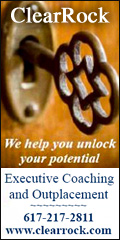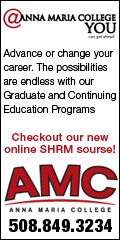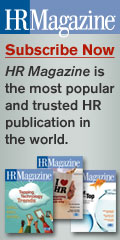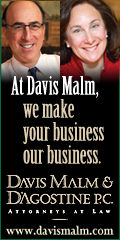NEHRA News
Northeast Human Resources Association
Ed Evarts: When we first met, Beth and I quickly realized that we had a shared passion for the impact that personality preferences can have on the performance of a leader. Our collective work was also focused on the areas of change, conflict, and communication. So, as coaches, the opportunity to positively impact the performance of business professionals in greater numbers than our individual work with clients was too good to pass up.
I have strong Human Resources and Leadership Development experience and Beth has an accomplished background in Career Coaching and Leadership Training. We recognized that two facilitators with varying backgrounds and experiences would provide a richer and more engaging experience for our participants.
How did you come up with the name?
Beth Kennedy: Our experience has been focused on helping individuals in the workplace be successful. It was important to us that the name of the program connected with our participants. We love the name Success at Work as it is a double entendre. The name describes the experience of success working and being successful at your workplace.
What does 'success at work' look like for each of you?
Beth: Having a background as a Career Coach, for me, success at work begins with an individual finding a position with a good career fit. The next step is the individual taking charge of their career and focusing on competency development and resiliency. As careers become busier than ever, individuals need to have resiliency. A key step in building resiliency is self awareness and this is where the personality preferences become a crucial step for being successful at work. It gives an individual a snap shot understanding of their natural strengths and blind spots and it can be applied to many areas that individuals need to work on in their career including, communication, change, conflict, and innovation.
Ed: For participants in our program, success at work starts with a deeper understanding of personality preferences and how individuals at work communicate, manage change, and navigate conflict differently due to their personality. While generic models on communication, change, and conflict are helpful, unless the personalities of the individuals involved are considered, an opportunity is being missed to maximize success.
How do you ensure concepts learned "stick" long after the program is over?
Beth: As students of facilitation and training, and having attending many training programs ourselves over the years, we find a major challenge for participants is too much theory and too little actionable next steps. Or, where a program is focused on actionable next steps, there are way too many! We like to call it the Dusty Binder Syndrome. Many programs have so much information that the brain cannot absorb it all. Within a week of the training, the binder is likely to be on a bookshelf in a participant’s office, collecting dust.
Ed: We also believe that one strategy does not work for all. We decided that our programs would be infused with two key characteristics: self awareness and action. Participants are able to customize strategies that work for their personality preference and the program provides a finite number of actionable strategies that participants can begin using right away. Motivation theory has shown that individuals are more likely to take action on their own ideas versus the ideas of others. By personalizing tactics and strategies, these activities are more likely to stick "long after the program is over."
Why do you choose to use the MBTI?
Beth: I began using the MBTI in 1991, and I have been trained in numerous other personality and leadership assessments. In my fifteen years of coaching and training, the one assessment on which clients have consistently given positive feedback is the MBTI. The recurring feedback is that the MBTI gives them a tool set to connect better with subordinates, colleagues, and their boss. The assessment also provides participates a greater awareness of areas in which they could improve to make a stronger impact at work. This feedback from diverse clients in different functions and industries has validated the success of the tool.
Ed: I came to the MBTI later than Beth. When I searched the market for a personality preference assessment tool to help my clients increase their effectiveness, there was no contest. The MBTI is the most validated and reliable personality assessment tool in the market. The depth of insight and the instant self awareness on clients' faces as they review their feedback for the first time is enough proof for me that this is a valuable tool.
In what ways did you consider adult learning styles in developing these courses?
Ed: We have purposely designed Success at Work to connect with the varying adult learning styles (visual, auditory, and kinesthetic) of our participants. Our visual learners will find engaging workbook materials, concise and colorful power point slides and clear case-study examples to help them visualize a situation. Our auditory learners will benefit from two experienced trainers who possess varying styles and the opportunity to actively participate in triad (three-person) discussions and debriefs with classmates. Our kinesthetic learners will have time during class to practice what they are learning and obtain instant feedback from other participants.
Why is Navigating Conflict your most popular course?
Beth: At the center of most conflict is an unmet need at the individual, team, or organization level. When you navigate conflict successfully, you increase trust, catalyze change, strengthen morale, promote innovation, and expedite decision-making. To harness the positive effects of conflict and to avoid conflict disasters, people need to be skilled at uncovering unmet needs through more effective conversations.
Conflict is a part of life that will always be here. It is not the conflict itself that creates drama within an organization or our lives. Rather, it is the way we approach it and how we respond to conflict that drains the energy from an individual, team or organization. More business professionals are realizing that learning to address conflict is a key strategy for their success.
Your programs are approved are HRCI certified, and they are also approved for continuing education credits for PMI—where do you see the overlap between project management and human resources?
Ed: We love the relationship that exists between human resources and project management. Most of our human resource participants would acknowledge they can increase their effectiveness through enhanced project management skills. Most of our project management participants would acknowledge they can increase their effectiveness through enhance human resource skills. By welcoming participants from these two areas, our learners have a richer experience. We are not trailblazers in this area however as NEHRA has a very popular program for its members called Project Management Skills for Human Resource Managers. We have seen in our program that both of these vocations can learn a lot from each other.
Why partner with NEHRA?
Beth: When we were strategizing on ways to bring Success at Work to the marketplace, we wanted to partner with an organization that had a strong footprint in the New England marketplace and creates a strong sense of community for its members. With our human resources and training background, NEHRA was the perfect fit.
There are a lot of other programs out there on conflict, communication, and change. What differentiates S@W?
Ed: We think that since there are other programs focused on these key areas, these topics are important in the market and they resonate deeply with business professionals. Our programs are different, however. We focus on the intersection of personality preferences and change, conflict, and communication. This is not a "one-size-fits-all" experience for our participants. Participants leave our program with insight into their personality, a unique communication, change, and conflict profile, a professional development certificate, and strategies for making an immediate impact once they return to their workplace.
Tell me more about the Professional Development Certificate.
Beth: In partnership with NEHRA, participants who complete all three Success at Work programs receive a Professional Development Certificate. Due to the recurring focus on personality preferences and the application of this information on change, conflict, and communication, participants build a new skill set allowing them to positively impact their effectiveness at work and their workplace in general. We thought participants who impact their workplace in a positive manner deserve to be recognized and a certificate seemed a perfect way to do that.
What makes the Success at Work learning experience different for participants?
Beth: In the feedback we hear from our participants, the differentiators include the variability of our delivery techniques, the triads where participants repeatedly work in small groups, the intersection between personality preferences and our topics, and the highly interactive experience which we actively cultivate. We don’t do a lot of "telling." We recognize there is a wealth of experience and insights already existing within our participants and we work to ensure this information is integrated into the program.
Could you share any feedback from your recent programs at NEHRA?
Ed: We’d love to. Many of our participants experience "aha moments" that help them be more successful at work. Here are just a few examples:
- Really happy attending the Success at Work Communication program – best training I have attended in a long time!
- I enjoyed the program and got a lot from it! I look forward to possibly bringing it to my organization.
- This program would be effective in any company to help build a better team!
- I will be aware of how to structure my communication taking into account the different personalities of my employees.
- I love how the program is tailored to my personality preferences and offers useful solutions based on my strengths and development areas. The instructors provide wonderful and useful tools!
For more information about Success at Work, and the certificate program please visit nehra.com
This led us to ask ‘how does excellence translate into HR practices?’ In a profession that often struggles to justify and measure its impact, excellence may feel like an elusive goal. Yet again, we know it when we see it. We know that companies who are consistently "considered best places to work" have excellent HR practices. We read about the time, effort and resources they invest to keep their employees engaged. We see the results of how they encourage innovation, with work environments that inspire creativity and encourage risk taking. We hear about how they empower employees to make bold decisions and support individual career development. All of these efforts involve excellent HR practices and all require excellent HR leadership.
Our quest for excellence will continue at this year’s spring conference on May 17-18 at the Four Points Conference Center in Norwood. This year’s HR Excellence Event will provide a bold look at how the profession is evolving and how to capitalize on significant changes in the workplace to create excellence in your own organization. For two action-packed days, we’ll hear how companies like Diesel, Gentle Giant, Constant Contact and Google are leveraging excellent HR practices to create a competitive advantage in both the local and global marketplace.
"Our Spring Conference has always been designed to offer a little something for everyone. This year is no different, but there is a twist. In addition to showcasing companies that truly represent Excellence, we’ve got some very special things planned to create a higher level of energy and excitement than we’ve ever had before," said Executive Director Tracy Burns. "The entire two days are packed with great ways to learn, network and enjoy yourself!"
The Committee’s goal this year is to provide a full spectrum of high quality educational sessions and practical resources, featuring best practices and emerging trends in Human Resources; we hope to see you there!
NEHRA’s Spring Conference will be held May 17-18 at the Four Points Conference Center in Norwood, MA. For a complete listing of conference events, and to register, visit the Spring Conference website by CLICKING HERE.
BoardProspects is pleased to invite NEHRA members to participate in BoardProspects’ exclusive beta program. As an early adopter, members will receive a one-year premium membership to BoardProspects.com for free. Please take a minute to visit BoardProspects.com/NEHRA to pre-register today.
BoardProspects’ Beta program captures interested prospects and boards via email registration. As an early adopter, you will be kept informed of our progress as we add functionality in preparation for our "go live" date this spring.
Find the right board for your management team.
Contact Becky Dowd:
Becky@BoardProspects.com 339-364-0061
BoardProspects also offers corporate membership discounts and opportunities for corporate sponsorships.
For more information or to sign up for this opportunity, contact the NEHRA office today at (781) 235-2900 or via email at info@nehra.com.
Activate Networks proudly presents Summit 2012: Harness Your Customer and Employee Networks to Drive Results, the world’s leading conference on leveraging physician’s social networks to identify influence, relationships and key action leaders to improve targeting. The conference will be held Tuesday, May 8, 2012 at the Charles Hotel, in Cambridge, Mass.
Join us as real leaders discuss how to improve organizational function, employee program effectiveness, innovation, and talent development.
NEHRA Discount code good for 20 percent off of full-priced ticket: NEHRA20
Space is limited - Reserve your seat now by clicking HERE.



